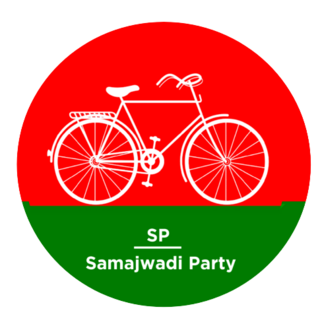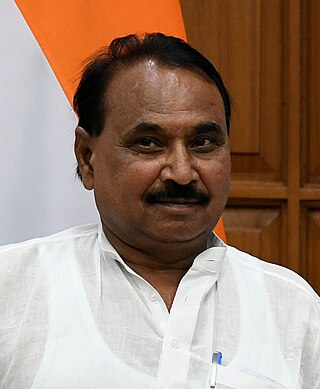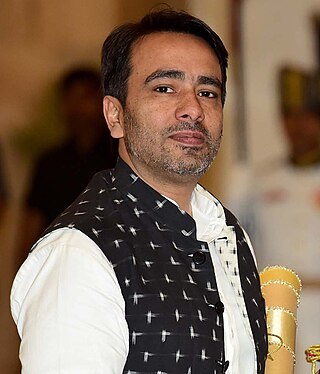Related Research Articles

The Bahujan Samaj Party is a political party in India that was formed to represent Bahujans,referring to Scheduled Castes,Scheduled Tribes,and Other Backward Classes (OBC),along with religious minorities. According to Kanshi Ram,when he founded the party in 1984,the Bahujans comprised 85 percent of India's population,but were divided into 6,000 different castes. The party claims to be inspired by the philosophy of B. R. Ambedkar,Jyotiba Phule,Narayana Guru,Chhatrapati Shahuji Maharaj,and Gautama Buddha.

The Samajwadi Party is a socialist political party in India. It was founded on 4 October 1992 by former Janata Dal politician Mulayam Singh Yadav and is headquartered in New Delhi. The Samajwadi Party is currently led by former Chief Minister of Uttar Pradesh,Akhilesh Yadav.

The 14th Lok Sabha was convened after the 2004 Indian general election held in four phases during 20 April –10 May 2004,which led to the formation of first Manmohan Singh ministry (2004–2009). Indian National Congress-led United Progressive Alliance won 62 more seats than previous 13th Lok Sabha. The Lok Sabha is the lower house in the Parliament of India. 8 sitting members from Rajya Sabha,the Upper House of Indian Parliament,were elected to 14th Lok Sabha after the 2004 Indian general election.
The Dhangars are caste of people found in the Indian states of Maharashtra,northern Karnataka,Goa,Madhya Pradesh. They are referred to as Gavli Dhangars in northern Maharashtra and the forested hill tracts of India's Western Ghats,there are many distinct Gavli castes in Maharashtra and Dhangar Gavli is one of them.
Gulaothi is a town,near Bulandshahr city in the Bulandshahr district that falls under the Meerut division of the Indian state of Uttar Pradesh.

Ramdas Bandu Athawale is an Indian politician,social activist and trade unionist from Maharashtra. He is the president of the Republican Party of India (A),a splinter group of the Republican Party of India and has its roots in the Scheduled Castes Federation led by Dr. B. R. Ambedkar since 1999. Currently,he is the Minister of State in the Ministry of Social Justice and Empowerment,Government of India since 2016 and represents Maharashtra in Rajya Sabha,the upper house of India's Parliament since 2014. Previously,he was Lok Sabha MP from Pandharpur from 1999 to 2009 and from Mumbai North Central Lok Sabha constituency from 1998 to 1999. He was also Cabinet minister of Maharashtra from 1990 to 1995 and a member of the Maharashtra Legislative Council from 1990 to 1996.
Ashok Kumar Rawat is an Indian politician from Sitapur District of Uttar Pradesh. He currently serves as a third term Member of Parliament(Lok Sabha) from Misrikh parliamentary seat of a Uttar Pradesh. In the recent 2019 Lok Sabha Elections,he won on a BJP ticket defeating his nearest BSP rival by a margin of just over 1 lakh votes. Earlier,he has contested and served two terms in the lower house as a member of the Bahujan Samaj Party. In 2019,he managed to retain his seat which he lost in 2014. Mr. Rawat with his exemplary performance was ranked 3rd in the number of questions asked in the 15th Lok Sabha as per PRS India Report.

Bhanu Pratap Singh Verma is an Indian politician and former Minister of State in Ministry of Micro,Small and Medium Enterprises in Government Of India. He stood for the 1996 Lok Sabha elections as BJP candidate and is Former Member of Parliament from Jalaun. He belong to the Koli community of Uttar Pradesh.
The Scheduled Castes and the Scheduled Tribes Act,1989 was enacted by the Parliament of India to prevent atrocities and hate crimes against the scheduled castes and scheduled tribes. In popular usage,including in parliamentary debates and in the judgements of the Supreme Court of India,this law is referred to as the SC/ST Act. It is also referred to as the 'Atrocities Act',POA,and PoA.

General elections were held in India between 25 October 1951 and 21 February 1952,the first national elections after India attained independence in 1947. Voters elected 489 members of the first Lok Sabha,the lower house of the Parliament of India. Elections to most of the state legislatures were held simultaneously.
In India,a number of political positions and university posts are held for specific groups of the population,including Scheduled Castes(SC) and Scheduled Tribes(ST),and women in some cases.

The Government of Uttar Pradesh is the subnational government of the Indian state of Uttar Pradesh with the governor as its appointed constitutional head of the state by the President of India. The Governor of Uttar Pradesh is appointed for a period of five years and appoints the Chief Minister of Uttar Pradesh and their council of ministers,who are vested with the executive powers of the state. The governor remains a ceremonial head of the state,while the chief minister and their council are responsible for day-to-day government functions.

Chaudhary Jayant Singh,better known as Jayant Chaudhary is an American born Indian politician who is serving as the 5th minister of Skill Development and Entrepreneurship since 2024. He is member of the Rajya Sabha from Uttar Pradesh since 2022. Previously,he also served as a member of 15th Lok Sabha from Mathura. He is the national chairman of the Rashtriya Lok Dal.
Virendra Verma was an Indian politician,born in Shamli,Uttar Pradesh. He served as the Governor of Punjab and the Administrator of Chandigarh (1990) as well as the Governor of Himachal Pradesh (1990–1993).
Satya Prakash Malviya was an Indian politician. He was elected to the Rajya Sabha in 1984 and 1990 from Uttar Pradesh. He served as Minister of Parliamentary Affairs and Minister of Petroleum and Chemicals in Chandra Shekhar cabinet from 1990 to 1991.
Ganga Devi was an Indian politician belonging to the Indian National Congress. She was elected to the Lok Sabha the lower house of Indian Parliament from Mohanlalganj in Uttar Pradesh in 1952,1957,1962,1967 and 1971. She was defeated in 1977 by Ram Lal Kureel.

Dr. Sudhanshu Trivedi is an Indian politician and former professor. A leader of the Bharatiya Janata Party and Member of Parliament from its Upper House,the Rajya Sabha since 2019. Trivedi is a senior National Spokesperson of the Bharatiya Janata Party.

Brij Lal is a 1977-batch IPS officer and an Indian politician. He is a Member of Parliament in the Rajya Sabha from Uttar Pradesh. He belongs to the Bharatiya Janata Party. He was the Director General of Police of Uttar Pradesh during the Mayawati Government.
Dharam Prakash was an Indian politician. He was a Member of Parliament representing Uttar Pradesh in the Rajya Sabha the upper house of India's Parliament as member of the Indian National Congress.
References
- ↑ "RAJYA SABHA MEMBERS BIOGRAPHICAL SKETCHES 1952 - 2003" (PDF). Rajya Sabha . Retrieved 29 March 2018.
- ↑ India. Commissioner for Scheduled Castes and Scheduled Tribes (1955). Report of the Commissioner for Scheduled Castes and Scheduled Tribes. Manager, Government of India Press. p. 95. Retrieved 20 September 2018.
- ↑ Uttar Pradesh (India). Legislature. Legislative Assembly (1941). Proceedings. Official Report. p. 3. Retrieved 20 September 2018.
- ↑ India. Parliament. Rajya Sabha (1979). Parliamentary debates: official report. Council of States Secretariat. p. 27. Retrieved 20 September 2018.